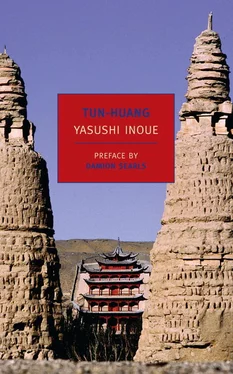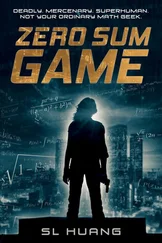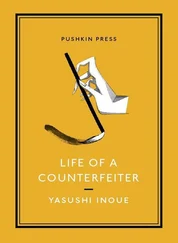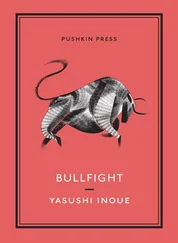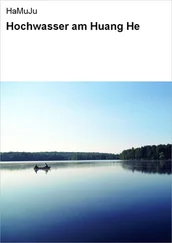The fighting continued deep into the night. Toward dawn, Wang-li called an end to the attacks and assembled his army. The Turfan vanguard had lost most of its men and had finally disappeared. Now the Hsi-hsia main army, stationed in the rear, set out to attack Turfan headquarters approximately seven miles away.
Wang-li led his men back to Su-chou. It began to snow. The next afternoon, the Hsi-hsia main army returned through deep snow victorious from its attack.
Within ten days of their victory, Ts’ao Yen-hui, governor of Kua-chou, leading one thousand cavalry, came to surrender to Hsi-hsia. This was a complete surprise. It meant that Hsi-hsia would control Kua-chou without further fighting.
Kua-chou and Sha-chou were then under nominal Chinese rule. In the past, Regional Commander Chang and his family had held the reins of government, but now power lay with the Ts’ao family. Governor Ts’ao Hsien-shun ruled Sha-chou, while his younger brother, Ts’ao Yen-hui, administered Kua-chou. Of the two, Kua-chou, which was situated close to Su-chou, had especially feared a Hsi-hsia invasion and so had voluntarily declared vassalage.
At some time or another Hsi-hsia would have to send troops to both these garrison towns, which for long had served as the gateway to the west. However, the situation regarding these two walled towns was extremely complex. Unlike the natives of Liang-chou, Kan-chou, or Su-chou, the people of Sha-chou and Kua-chou were neither Turfans, Uighurs, nor related tribesmen, but were legally Chinese citizens. At present, they were no longer under direct control of their mother country, China, and appeared independent, but they had not completely cut off ties with the Sung dynasty either. Even now, the ruler Ts’ao received his title of regional commander of Sha-chou from China, although this was a mere formality. If other tribes had not settled between this territory and China, it would naturally have remained a part of China. It had been cut off, in fact, by the encroachment of other tribes, and was a small Chinese island forced by circumstances to form an independent government. Although it was small, it was west of the Wu-liang area and was literally the gateway to the west; all western culture passed from here to various countries in the east, and all types of western goods also came on camels through this narrow corridor.
Thus, when Kua-chou had voluntarily declared vassalage to Hsi-hsia, the Hsi-hsia rulers were naturally excited. Hsi-hsia would probably not lose the opportunity of bringing Kua-chou under its control; troops would be sent to Sha-chou in the west, and at one stroke the Hsi-hsia would gain complete control of all the territories. These rumors circulated around Hsing-te’s unit, but the actual invasion did not take place. The majority of the Hsi-hsia main army evacuated Su-chou, though Wang-li’s unit and a few others remained. Hsing-te was able to spend comparatively peaceful days in this desert city where it never rained. Once in a while he walked across the ashlike earth to the mud-walled temple library in the center of town.
The next year, 1032, the Hsi-hsia emperor, Te-ming, died at the age of fifty-one. His son, Yüan-hao, succeeded him. Te-ming had been a moderate man who, by maintaining the delicate balance between Khitan and China, had avoided any setbacks for his newly rising country during his rule.
Yüan-hao, unlike his father, was aggressive in all ways. He had always been at odds with his father’s foreign policy. His father had entrusted him with military affairs from early youth, so Yüan-hao was experienced in actual warfare. He had never lost a single battle. His victories included those at Liang-chou, Kan-chou, and Su-chou, and at present he had supreme confidence and feared no one. Yüan-hao had always believed that the Hsi-hsia should live according to their own traditions; indeed, it was said that he once remonstrated with his father for wearing brocades presented by China.
When Yüan-hao succeeded to the throne, the Turfan leader, Chüeh-ssu-lo, moved from the walled city on the Tsung River to Ching-t’ang and readied his troops for battle with Hsi-hsia, as if to show his opposition to the new regime.
Yüan-hao no longer feared a war with China; but before initiating one, he wanted to crush its Turfan allies and to annex Sha-chou at the same time. However, both Chüehssu-lo and Yüan-hao waited for the right moment and did not move their troops.
In this tense atmosphere, on the brink of war, Wang-li and Hsing-te whiled away their time until the following spring. Hsing-te spent this whole period studying the Buddhist sutras. In the past half year he had delved into all the discourses on the sutras he could find.
In March, Wang-li’s unit suddenly received orders to occupy Kua-chou. Up to that time not a single Hsi-hsia soldier had been stationed in Kua-chou. Since Yen-hui, the Kuachou ruler, had declared vassalage to Hsi-hsia, envoys had passed between the two nations, but Hsi-hsia had not sent troops to Kua-chou since it was nominally an independent country. But now the situation had changed. Everyone felt that Yüan-hao’s aggressive attitude was ominous.
Wang-li, now the commander of five thousand Chinese troops, left Su-chou, where he had been stationed for two and a half years. Hsing-te rode with him at the head of the unit. It was the time of the year when the white grass used for camel fodder grew abundantly.
“On the road from Chi-ch’üan west to Yü-men, the thousand mountains and all the plains are covered with white grass.” Hsing-te recalled this line from an ancient poem he had read years before in his home country. Teaching it to Wang-li, he told him that, if the poem was correct, the white grass they were riding through would continue all the way to Kua-chou.
Wang-li did not reply, but asked instead with obvious emotion why Hsing-te had come to the frontier. He added that Hsing-te should have returned to China from Hsing-ch’ing.
“But since I’m here, there’s nothing I can do about it,” Hsing-te said with a laugh.
“That’s right; now you’re here, there’s nothing you can do. You came back with your mind made up to grow old and wither away in the white grass plains,” Wang-li said.
Hsing-te felt that some allusion to the Uighur girl’s death lay in Wang-li’s words. Since the night the unit had stopped at the dry river bank between Kan-chou and Su-chou, and they had talked each in his own way of the death of the Uighur princess, neither had mentioned her. It was as though they had made a firm vow on it.
Hsing-te seldom thought of the woman now. It was not that he made an effort to forget her, but somehow as time passed he thought of her less often. It did not mean that his love for the Uighur woman had decreased. He thought of her infrequently, but whenever he did, her image was always clear. In fact, each time it became more vivid. Hsing-te could recall the woman’s eyes, nose, and mouth. He also remembered her complex smile the last time he had seen her — joy, sorrow, and surprise all fused together. And he remembered, with vividness and clarity, that small dot tracing a fine line as it fell to the ground from the wall of Kan-chou.
Whenever he thought of the Uighur girl, he was filled with peace. This feeling was not love for a lost one, nor was it mourning; it transcended such emotions, and was more akin to admiration for something pure and perfect.
“All is karma.” Hsing-te borrowed the Buddhist words. He thought that Wang-li wouldn’t understand the meaning of a word like “karma,” but there was no other term to express his feelings.
Wang-li ignored Hsing-te’s words. “When we are stationed in Kua-chou, you should find employment under the Kuachou ruler. There should be some kind of work for you. I don’t know whether it’s karma or not, but it is a mistake for you to be in the Hsi-hsia vanguard. I’m sure of that. Kua-chou is full of Chinese like you and me. If you’re patient,” he added, “there’ll probably be many opportunities for you to return to China.”
Читать дальше
